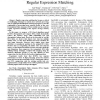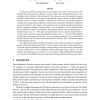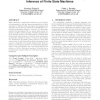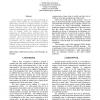81 search results - page 7 / 17 » A Formalisation of Finite Automata Using Hereditarily Finite... |
149
click to vote
ICC
2011
IEEE
14 years 28 days ago
2011
IEEE
—Regular expression matching has become a critical yet challenging technique in content-aware network processing, such as application identification and deep inspection. To meet ...
103
click to vote
LPAR
2010
Springer
14 years 11 months ago
2010
Springer
A rational and selfish environment may have an incentive to cheat the system it interacts with. Cheating the system amounts to reporting a stream of inputs that is different from ...
GECCO
2007
Springer
15 years 7 months ago
2007
Springer
With resemblance of finite-state machines to some biological mechanisms in cells and numerous applications of finite automata in different fields, this paper uses analogies an...
101
click to vote
GECCO
2005
Springer
15 years 6 months ago
2005
Springer
The iterated prisoner’s dilemma is a widely used computational model of cooperation and conflict. Many studies report emergent cooperation in populations of agents trained to p...
ICRA
2003
IEEE
15 years 6 months ago
2003
IEEE
We present an approach that uses Q-learning on individual robotic agents, for coordinating a missiontasked team of robots in a complex scenario. To reduce the size of the state sp...




